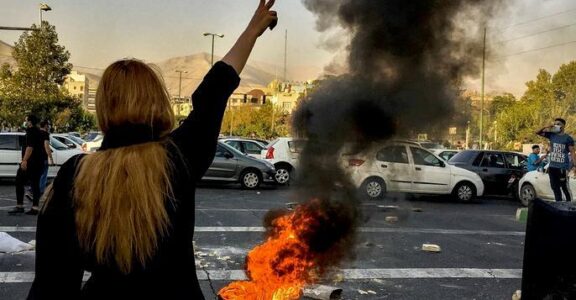
Iranian protesters need our support
Consider the following countries: Albania, Argentina, Bahrain, Denmark, France, India, Kenya, Thailand, and the United Kingdom. What do they have in common? Only this: All have been on the receiving end of Iranian-sponsored terrorism.
A strange list, no? I mean, what possible interest does Iran have in, say, Argentina? In 1994, a Jewish cultural center in Buenos Aires was bombed, with 85 fatalities and hundreds of injuries. The trail led back to Tehran. Perhaps it was precisely Argentina’s distance from Iran that made it an attractive target. Perhaps the mullahs wanted to show that they could strike anywhere. Perhaps they were signaling that state sovereignty, territorial jurisdiction, and geographical remoteness meant nothing to them.
That is, in a nutshell, why the international community must not be neutral about the unrest in Iran, now entering its 13th week. The demonstrations, sparked by the death in custody of Mahsa Amini, arrested by the morality police for wearing her hijab “improperly,” have spread to all 31 Iranian provinces. The execution of the first protester on Thursday did not stop school after school, college after college, in joining the protests. A general strike is now underway.
There have been protests before, but never so widespread, and never led by women. Almost all the regime’s opponents — secularists, Sunnis, monarchists, communists, national minorities — are united in their anger. A combination of strikes and street protests brought the ayatollahs to power in the first place. Who is to say that it won’t bring them down?
So, should we in the West get involved? And, if so, what can we practically do?
The answer to the first question is easy. We have been involved, whether we like it or not, since the mullahs seized power in 1979. When we think of the Islamic Revolution, we tend to overemphasize the first word and underemphasize the second. Yes, Iran’s leaders are theocrats, but, more immediately, they are revolutionaries, committed to spreading their revolt across the world.
Like French revolutionaries after 1789 or Russian revolutionaries after 1917, they immediately spilled out from behind their borders, sponsoring militias and terrorist cells on every continent, seeking to replicate their ideology.
Their intentions were clear from their first act, namely the attack on the U.S. Embassy in Tehran. It is hard, 44 years on, to convey quite how shocking it was to make hostages of diplomatic personnel. The sanctity of legation buildings is the cornerstone of the international order. Even during the Second World War, when dictatorships fought to destroy one another, diplomatic personnel were peacefully evacuated through neutral countries.
In refusing to recognize that norm, the ayatollahs were sending out the clearest possible signal: “Your rules don’t apply to us. We don’t acknowledge your international law.” When we find that the global order is disrupted by Hezbollah, or by Hamas, or by the Houthis in Yemen, or by Syria’s rogue regime, we are, in reality, dealing with Iran. When we face the flow of drugs, including fentanyl, into the West, we are again often dealing with Iran.
Revolutionaries are precisely that — revolutionary. Their regimes depend on a degree of overseas conflict. In Leninist terms, they export their internal contradictions. Or, to borrow a metaphor from chaos theory, they drink order from their surroundings.
True, the 2015 nuclear deal made it harder for the mullahs to build WMDs, and that is not nothing. But it also unleashed funds for them to pursue their mischief in other ways. It is what they do.
If we want to check Russian revanchism, we should remove the ayatollahs. If we want to deter Chinese aggression, we should remove the ayatollahs. If we want to preserve the international order, we should remove the ayatollahs. The liberation of 100 million Iranians from despotism is a happy bonus.
What, then, can we do? First, we can fund the regime’s opponents, giving people the wherewithal to see this through. Second, we can identify the local commanders who are ordering crackdowns, subjecting them to travel sanctions now and making it clear that they will eventually have to defend their actions in court. Third, we can recognize a legitimate Iranian government. In doing so, we must avoid the mistakes we made in Iraq, where we allowed the regime’s opponents to nominate themselves. Finally, we can make clear that, if they want to keep our goodwill, the Saudis and their neighbors should produce enough oil to lower the price of a barrel significantly.
This last point has until now proven difficult. But the potential prize for the Saudis, and for the rest of us, is vast. A world in which a new Iran can take its place as a civilized nation will be an altogether warmer, brighter, and safer one.
Source: msn





